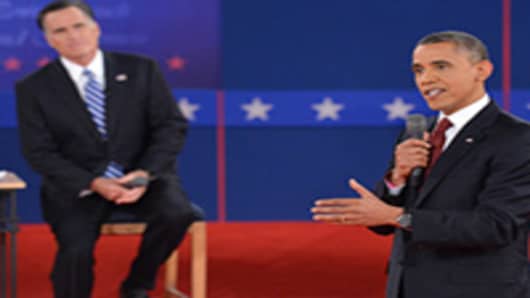Two weeks before Election Day, President Barack Obama and Mitt Romney are deadlocked at 47 percent among likely voters in the race for the White House, a new NBC News/Wall Street Journal poll shows.
Among the larger universe of all registered voters, the Democratic incumbent draws 49 percent to 44 percent for his Republican challenger. That finding underscores the urgency of each side's attempt to rouse supporters to the polls on Election Day, or before that in many states that permit early voting.
The telephone survey of 1,000 voters, conducted Oct. 17-20, carries a margin for error of 3.1 percentage points.
The findings come as Obama and Romney prepare to face off Monday night in their last of three presidential debates. The 90-minute session, at Lynn University in Boca Raton, Fla., will be moderated by Bob Schieffer of CBS News. (Read More: Obama Regains His Footing in Feisty Second Debate.)
The tie among likely voters represents an improvement for Romney from the NBC/WSJ poll in late September, before either of the first two presidential debates. He trailed among likely voters then with 46 percent to Obama's 49 percent.
Romney's uptick results in part from regaining his previous edge among voters on which candidate can best manage the economy. By mid-September, Obama had neutralized that edge, with 43 percent of voters saying each candidate was better on the issue.
Now, however, 46 percent of voters say Romney can best manage the economy, while 40 percent name Obama.
Romney has also narrowed the gap in voter preference on the ability to serve as commander-in-chief. Some 44 percent prefer Obama on that issue, compared to 41 percent for Romney — closer than Obama's 47 percent to 39 percent edge in late September.
That finding could be influenced by the Obama administration's handling of recent violence in Libya. A 39 percent plurality said the attack could have been prevented, compared to 26 percent who said it could not have been.
Overall, voters split neatly evenly on Obama's performance as president. Some 49 percent approve, while 48 percent disapprove. (Read More: Romney's 'Binders Full of Women' Comment Goes Viral.)
On dealing with the economy, 46 percent approve, while 52 percent disapprove. On dealing with foreign policy, a 49 percent plurality approves, while 46 percent disapprove.
Obama benefits from strong advantage over Romney on "being easy going and likable," dealing with "issues of concern to women," "being compassionate enough to understand average people", and "looking out for the middle class."
Romney, for his part, has pulled even on having "strong leadership qualities," while maintaining his leads on dealing with jobs and the budget deficit.
The race continues to be marked by a strong gap in preferences between men and women voters. Men prefer Romney by 10 percentage points; among white men, he leads by an overwhelming 60 percent to 34 percent. (Read More: Romney Still Trails Obama in 2 Key Swing States: Polls.)
Women back Obama by eight points. They are critical, along with Obama's overwhelming advantages among African-Americans and Hispanics, to the incumbent's competitiveness.
The advantage in the race that Mr. Obama seized after both party conventions this summer "has been erased," analyst Peter Hart said. "The election's a dead heat."
One important achievement for Romney this fall, the NBC/WSJ poll shows, has been improving his own image. In mid-September, 38 percent of voters expressed a favorable view, while 43 percent expressed an unfavorable.
Now, 43 percent are favorable, while 44 percent are unfavorable. (Read More: Obama, Romney Tax Plans: A Real Case of 'Go Figure.')
The fact that Romney runs even with Obama with likely voters, while trailing by five percentage points with all voters, reflects a higher level of enthusiasm among his supporters. That makes each campaign's ability to turn its voters on election day a critical factor in the outcome.
Another key over the last two weeks of the campaign may be Romney's ability to reduce his deficit among Hispanic voters — now more than 40 percent.
"The things that Romney needs to do to win are now in place with white constituencies," pollster Bill McInturff said.
—By CNBC's John Harwood; Follow Him on Twitter @JohnJHarwood



